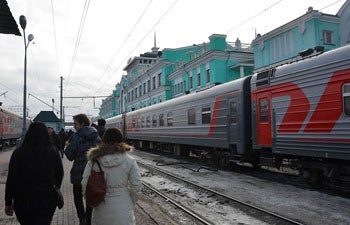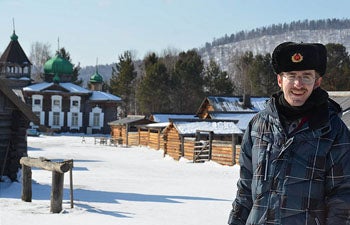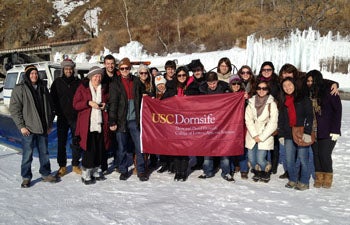Breaking the Ice in Siberia
Spring break tends to conjure up images of tropical beaches, sunshine and around-the-clock swimsuit fashion. There’s one thing it definitely does not bring to mind: Siberia.
Putting the “alternative” in alternative spring break, 18 USC Dornsife undergraduates spent theirs on the frozen tundra as part of a 2-unit study-tour course. In addition to coursework stateside, in March the group traveled to Russia for eight days.
The class, open to Russian-speakers and the uninitiated, was designed to offer students of all majors a broad view of Russian culture, history and geography — topics that otherwise might not be broached in their undergraduate studies. The course was led by Tatiana Akishina, professor of Russian; Sally Pratt, professor of Slavic languages and literatures; and Dan Bayer, executive director of the USC Dornsife Language Center.
Upon arrival in Moscow, students had a day of sightseeing. They visited Red Square, the city’s grand central square. They were awestruck by the elaborate and uncharacteristically whimsical colors of the onion domes on St. Basil’s Cathedral, which looked straight out of a fairy tale. They toured the Kremlin and visited GUM, the city’s immense, formerly state-run department store that now boasts upscale shops.
“[Russia] was fantastically foreign,” said Teddy Fischer, an environmental studies major. “In Moscow we stayed at the Leningradskaya Hotel, which occupies one of the ‘Seven Sisters,’ a group of elaborate skyscrapers around the city built during the soviet era. We had a great view of the trains and could really see the style in which the city was designed.”

The travelers rode the Trans-Siberian Railroad for three days straight en route from Moscow to Lake Baikal in central Siberia, just north of Mongolia. It is the longest railway in the world, spanning 11 time zones. Photo by Francesca Martens.
The next day the group boarded the legendary Trans-Siberian Railway (made famous in the 1965 film Dr. Zhivago, based on a novel by the same name). Completed in 1902, it is the longest railway in the world, spanning 11 time zones and connecting Moscow with Vladivostok in the Russian Far East. The group traveled for three days straight to Lake Baikal, located just north of Mongolia in the heart of Siberia. It is the most voluminous freshwater lake in the world and at 5,387 feet, the deepest.
Creative writing major Casey Herndon, a self-proclaimed Slavophile, loved the train trip across snowy Siberia and took advantage of the stops to hop off and explore the villages. Students had a chance to interact with locals and buy the cheap, home-cooked food sold by babushkas at the station, usually simple but delicious plates of meat and potatoes.
“When we stopped at Omsk, there was an athlete returning home from training,” Herndon recalled. “He had qualified for the 2014 Winter Olympics and the entire town turned out to greet him. He had a big trophy with him and looked very happy. It was great to see.”
Once at Lake Baikal, experts in biochemistry and ecology from the Russian Academy of Sciences gave the group lectures on environmental issues affecting the lake.
“What we learned at Lake Baikal built upon my studies of water resources, pollution and fishing issues at USC and broadened that base of knowledge,” Fischer said. “The lake is a unique and contained body of water, so it made a great model for understanding pollution and water ecology.”

Creative writing major Casey Herndon poses with his Russian ushanka hat at the Talzy Museum, near Lake Baikal. The museum showcased historical wooden architecture of Siberia. Photo by Francesca Martens.
Herndon was mesmerized by the sight of the lake.
“Lake Baikal was completely frozen over, and looking out over the horizon and seeing that frozen expanse – it was almost like an ocean,” said Herndon. “The ice on the lake wasn’t that misty whiteness we think of when we think of ice — it was clear, almost like glass. You could actually see the bottom looking down.”
In the lakeside village of Listvyanka where they stayed, the undergraduates took advantage of some of the local recreation. The group piled in to a hovercraft and raced across the frozen surface of the lake, then spun around and around in circles. Some of the students ventured into a Russian banya, or bathhouse, a sauna-like experience in which you get as hot as you can stand before pulling a cord that dumps on you a bucket of cold water or jumping into a cool pool.
“And if you’re a really tough dude, then you go outside and roll around in the snow. Some of our own tough dudes did just that,” laughed Pratt. “I was very impressed!”
Another goal of the trip was finding opportunities for interaction with Russians, a sometimes challenging effort. Professor Akishina, herself Russian, gave students tips on ways to break the ice. A literature professor, Pratt talked to students about some of the main Russian authors, information they could use in chats with Russians.
The lesson proved useful.

Undergraduate students and faculty members display their USC Dornsife pride atop three meters of ice on Lake Baikal, the largest freshwater lake in the world by volume. Photo by Dan Bayer.
Pratt recalled a late night on the train, when students were up making noise and their conductor came by, angrily shushing them. Conductors on this train, mostly female, were sometimes quite tough, and this one was no exception. She had remained aloof and unsmiling throughout the trip.
Pratt had taught the students a couple of lines from Alexander Pushkin’s main work, the novel-in-verse Eugene Onegin. Pushkin is considered the lynchpin of Russian culture, one of those beloved authors whom everyone knows. So immediately following the conductor’s scolding, one of the students — not even a Russian major — stood up and spontaneously recited the first two lines of Onegin. After a moment of disbelief, the conductor started laughing so hard she cried. They all hugged and were buddies the rest of the trip.
“I truly believe that the ability to understand how communication and behavior work in different cultures is a necessity in our global economy,” Akishina said. “Not only learning about theories, but when students try them out and succeed, those became very valuable learning experiences.”
Pratt was impressed with the students.
“They were amazing,” she said. “In all my years of taking students to Russia, I’ve never seen a group as hardy and well-adjusted.”